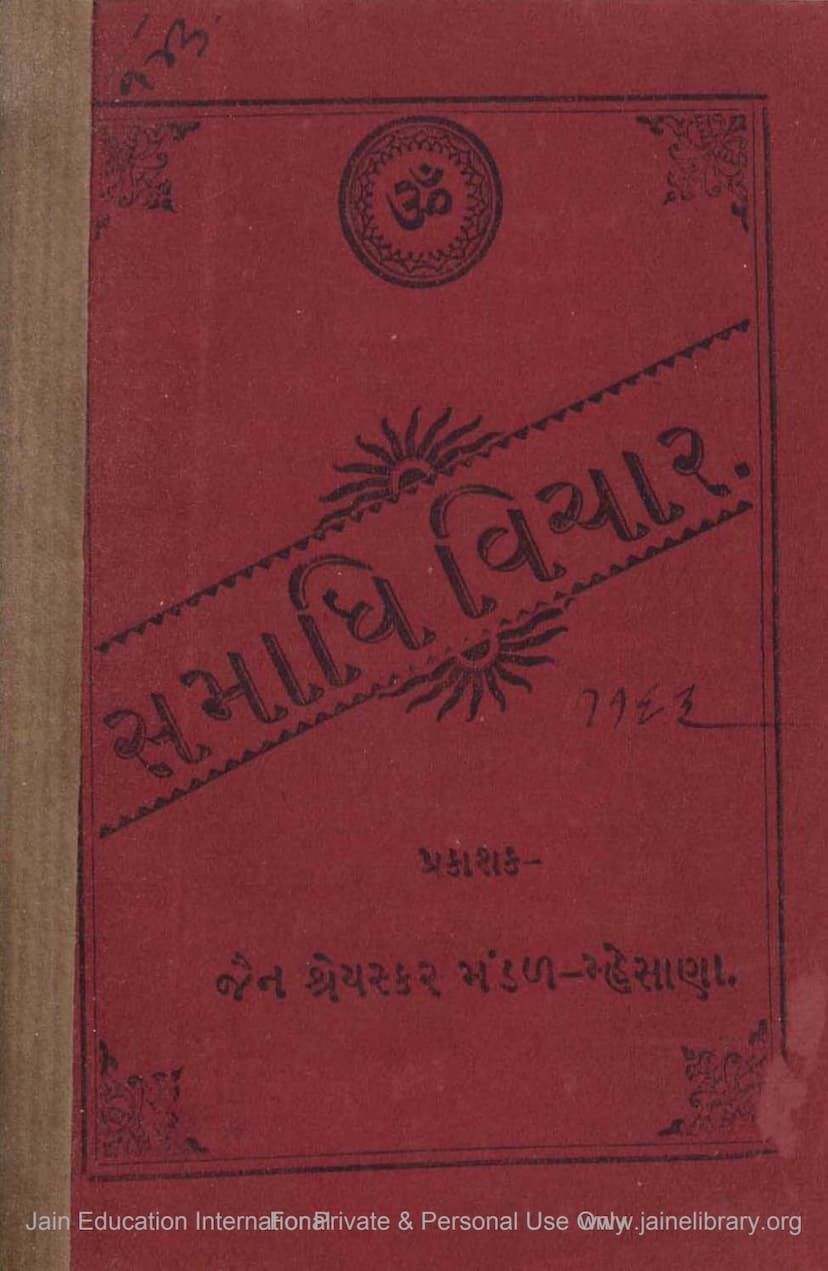Samadhivichar
Added to library: September 2, 2025

Summary
Here's a comprehensive summary of the Jain text "Samadhivichar" by Bechardas Bhagwandas, based on the provided pages:
Book Title: Samadhivichar (A Consideration of Equanimity/Samadhi) Author(s): Bechardas Bhagwandas Publisher: Jain Shreyaskar Mandal Mahesana
Overall Purpose: The book "Samadhivichar" is presented as a spiritual guide aimed at helping individuals achieve equanimity (Samadhi) and attain liberation. It emphasizes the importance of understanding the true nature of the soul, the impermanence of the physical body, and the proper way to face death with spiritual composure.
Key Themes and Content:
-
The Nature of the Soul and Body: The text delves into the relationship between the body and the soul, highlighting the body's transient nature and the soul's eternal, conscious, and indestructible qualities. It explains that the degree to which these soul-qualities are manifested leads to equanimity, and their lack of manifestation leads to non-equanimity.
-
The Importance of Equanimity (Samadhi): The book stresses that all beings have an innate need for self-contentment and the equanimity that comes from abiding in one's true nature. However, due to misconceptions like identifying with the body, ego, ignorance of the true self, and the influence of karma, achieving this equanimity is difficult. This leads to endless suffering in the cycle of birth and death.
-
Facing Death with Equanimity (Maran Samadhi): A significant focus is placed on the moment of death. The text states that even a brief moment of equanimity at the time of leaving the body can be transformative. It emphasizes that the state of mind at death determines one's next destination. The book offers guidance and remedies for achieving "Pandit Maran" or "Samadhi Maran" (death with equanimity).
-
The Illusion of Attachment and Identity: The text points out how individuals mistakenly identify themselves with their physical bodies, their relationships, and their social statuses (e.g., king, pauper). This mistaken identity, filled with worldly attachments and the ego, leads the soul to experience countless deaths in a state of non-equanimity. It argues that until one gains a proper understanding of their true self, this cycle of suffering will continue.
-
The Inevitability of Death: Death is presented as an unchangeable law that applies to all beings, from the smallest creature to the most powerful celestial beings. The text uses metaphors like "a fruit that ripens must fall" and "that which is gathered must be dispersed" to illustrate the impermanence of worldly relationships and possessions.
-
Overcoming Fear of Death: The book suggests that texts like "Samadhivichar" can help overcome the fear and distress associated with death. It draws a parallel between a householder changing houses and the soul leaving the body; for the enlightened, both are natural processes accompanied by joy. They are prepared for death whenever it may arrive, unlike ordinary beings who are often caught by death with unfulfilled desires and regrets, leading to immense suffering.
-
The Role of Knowledge and Renunciation: The text highlights the transformative power of understanding one's true nature – the soul being immortal and unchanging. It emphasizes that realizing the body is temporary and that attachments are like a rented house will lead to equanimity. The book aims to provide this understanding through its teachings.
-
Content of the Book:
- Introduction (Bhūmikā): Sets the stage for the book's purpose and its adapted nature.
- Gautam Swami Ras: A devotional ode or song in praise of Lord Gautam Swami, the chief disciple of Lord Mahavir. It describes his wisdom, spiritual stature, and his journey to enlightenment.
- Samadhi Vichar: The core text, presenting the discussions and contemplations on equanimity and the nature of the soul, written in a simplified Gujarati/Hindi mix.
- Doha by Chitthanandji Maharaj: Motivational verses.
- Punya Prakash Stavan: A hymn or devotional piece that reinforces the principles of spiritual merit.
- Padmavati Aradhana: A ritualistic or devotional practice related to Goddess Padmavati, included for strengthening spiritual understanding.
-
The Four Brahmaviharas (Page 5): The text briefly explains the four divine states of mind (Brahmaviharas) as described in Jain philosophy:
- Maitri (Friendliness): Wishing for the well-being of all beings.
- Karuna (Compassion): Having a deep feeling for the suffering of others and making efforts to alleviate it.
- Mudita (Sympathetic Joy): Feeling happy at the prosperity and virtues of others.
- Upeksha (Equanimity/Impartiality): Overlooking the unavoidable faults of others, not harboring attachment or aversion, and remaining composed by understanding their karma. These are considered essential for spiritual growth.
-
The Translation and Adaptation: The book is a translation and adaptation from an original Marwari text by Bechardas Bhagwandas, who aimed to make the profound spiritual teachings accessible in a simpler, mixed Gujarati and Hindi language.
-
The Publisher's Message (Page 2): The publisher, Jain Shreyaskar Mandal, emphasizes that the books are distributed as gifts for the benefit of all. They urge readers not to claim false ownership or misuse the books but to take full advantage of them and share them freely with others, thus fulfilling the noble intention behind their distribution.
In essence, "Samadhivichar" is a practical spiritual treatise that aims to guide the reader towards understanding their true, eternal self, detaching from the transient material world, and ultimately achieving a state of serene equanimity, especially in the face of death, to secure a favorable future existence and eventual liberation.